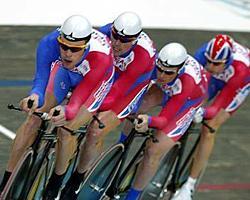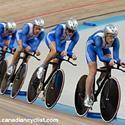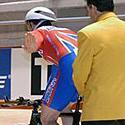
Recently on Cyclingnews.com |
Introduction to Track Racing - What's a Wheelrace? - Introduction to Six Day racing - UCI codes
An interview with Bryan Steel, November 24, 2004
Britain's Man of Steel

|
The old adage, "every cloud has a silver lining" could have been written for Bryan Steel. One of Britain's finest ever track cyclists, he notched up no less than nine silver medals in a career that took him to four Olympic Games and 14 world championships.
Now, "Bryan the Lion" as he was dubbed by Britain's cycling supremo Simon Jones, has retired and being a down-to-earth Midlands man rather than Hollywood crooner or a billionaire boxer, he means it. That said, he did arrive for an interview with Rachel Williams in his home town of Rugby on two wheels, but a good deal slower than the 60 kilometres an hour he regularly rode on the world's cycling stage.
With him was the precious silver medal that he'd won as part of Britain's team pursuit squad in Athens. At the time, many cycling fans had lumps in their throats at the sight of the British team being pipped for gold yet again by the Australians. And for Bryan there was a huge wave of sympathy. After being the bedrock of the British team's rise from being the also-rans of world cycling to the undisputed second best in the world, he was left out of the final four-man line-up.
Being a great team member, he hides his personal disappointment with the collective sadness of the team once more just missing out on gold. "It was a different Olympics for us because we all thought we could win it," Bryan explained. "In the past we thought we could get a medal and that was our aim but in Athens we were there to win it and although it's good to get silver, we were all disappointed not to win the gold."
""It sure is nice to be able to show people a medal rather than say, 'I came second at the Olympic Games.'"- Bryan Steel on his belated medal ceremony, where he was part of British team pursuit squad that won an Olympic silver medal in Athens, but not part of the quartet that rode the final |
For Bryan, however, that near miss was all the more painful. He had been in great form during the first round of the Athens competition where he had raced but then watched from the sidelines in the second round as his team-mates went under four minutes for the first time ever - a quite phenomenal achievement which equates to the four men riding at an average speed of 60kph for four kilometres.
He knew the decision to leave him out was a terribly difficult one to make and wonders aloud whether it was partly sparked by the knowledge of his impending retirement.

|
"It was really hard knowing it was going to be my last race and that got in the way," he admits. "Ever since the World's, I have been struggling with that and putting pressure on myself, thinking this is the last time I am going to do this and that I had to make the most of it.
"It was perhaps one of the factors that went against me in picking the team for the final as I was getting quite emotional, which is understandable but I shouldn't have let it get in the way really." Ironically, the decision to omit Bryan from the final line-up was taken by Simon Jones, the man Bryan describes as the best thing to happen to his career.
"It was him that turned my career around," Bryan says simply. "If it wasn't for Simon, we would not have moved on like we have done. We would never have got one Olympic medal, never mind two. We were mediocre and on a good day we might get fifth in the World's or scrape home in fourth on a really good day. But Simon shook it all up.
"He wasn't scared to change things and cut things which is the big thing for sport. Whereas some people may have a plan that isn't going right and still stick to it, Simon is like, 'It's not going right, lets change it.' And that's the big thing with him, he's not scared to change things around."
His omission from the final line-up meant that Bryan was unable to cap his career by standing on an Olympic podium. Only the four riders who competed in the final were allowed to collect their medals and it was only after an appeal that the International Olympic Committee agreed that those who had ridden in earlier rounds should also be given their gong.
And talking of clouds having silver linings - the agony of missing out in Athens meant resulted in an emotional medal ceremony at Buckingham Palace last month where he finally received his silver medal from the Royal Princess. For Bryan, that proved almost as good as getting it in Greece, as his beloved wife Dawn was able to share the experience with him.

|
He recalled: "It was a wonderful moment - as close as you could get to an Olympic medal ceremony and it was great that Dawn could be there to share it with me. Without her support I wouldn't have made it to Athens anyway, so it was fitting in a way.
"Immediately after the Games, I had been so keen to get the medal that I wanted them to post it to me if necessary. I'm glad I waited but it sure is nice to be able to show people a medal rather than say, 'I came second at the Olympic Games.'"
Bryan, who was born in Nottingham, first got into cycling as a teenager, inspired by his older brother. For most of his career, he struggled to get by in a sport that attracts very little funding and says looking back, lottery funding which became available in 1998 was the best thing to happen to him.
"Riders get a liveable wage now through funding," he said. "In the past, riders were paid nothing but some got money for coaching. Now, riders can afford to buy in top class coaches. The funding comes from UK sports, the national lottery, and it's on a 'league table' system so the more successful the sport, the more funding it gets.
"Of the 24 cycling athletes that went to Athens we won six medals, coming second after sailing in the British success league table, which hopefully means a blank cheque for funding!"
Bryan also hopes that this will help him to find work within the sport he loves now that he has retired. He admits that it won't be easy: "I don't really know yet what I want to do. James Pope at Face management (PR Agency in London who works for British Cycling) has helped me no end, really. We went through my options and yes I do want to be involved in cycling, but there is the thing that I don't want to be away from home anymore.
"For the last four years, it's been about winning Olympic Gold and nothing else." |
"So we have to wait and see what funding there is going to be before we make any decisions on the coaching side. I am ready for a new challenge though. I wouldn't retire if this wasn't out of my system, and I have no regrets. I have given everything I have to give to my sporting career and there is no more left to give as a racing cyclist.
"It would be fantastic if I could get a job in the sport and give back something to the younger riders, because we need the younger riders to come through - if you take away half the Athens team, we are in trouble. I am concerned about that and would love to show them the ropes and help prepare the next generation of medal winners."

|
Bryan is certain that retirement will mean enjoying a lot more time with his wife Dawn, who has put up with the endless training schedules that have dominated his life and meant him missing out on countless parties and anniversaries.
And he is absolutely clear about one thing: "I am not intending to race again. I will still ride my bike for enjoyment but you have to draw line in the sand.
"I can't say I'm not going to ride a bike again because it's a big part of my life but it doesn't interest me to be a club cyclist. It did to start to with but for the last four years, it's been about winning Olympic Gold and nothing else.
"I said all along if I didn't think we were going to win I would haven't been doing it. Right up until the last minute I thought we could win it. If I had been told a year ago, 'You have no chance of winning,' I would have retired then."
Although they missed out yet again, Britain's cycling fraternity is relieved that Bryan stayed with the team through to the Olympics.
A British team without "Bryan the Lion" will be a strange sight in Beijing in 2008 but no-one should rule out the likelihood that he'll be involved somewhere - grooming the next generation to win the gold that so agonisingly eluded him.
